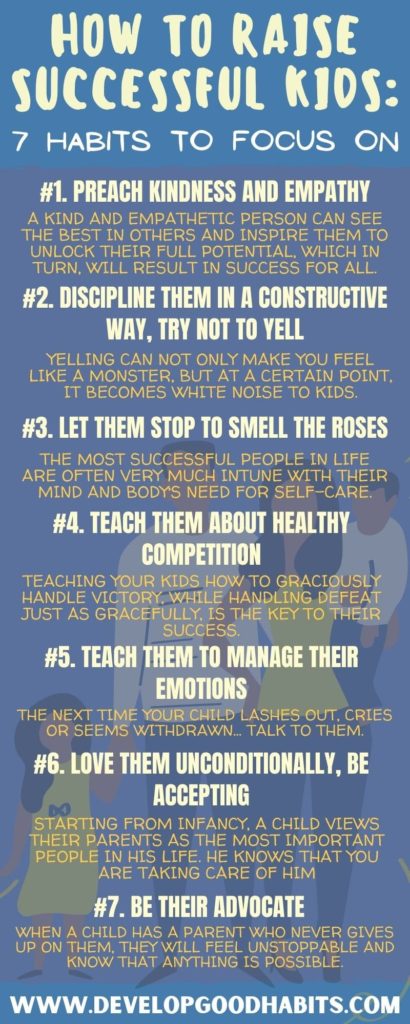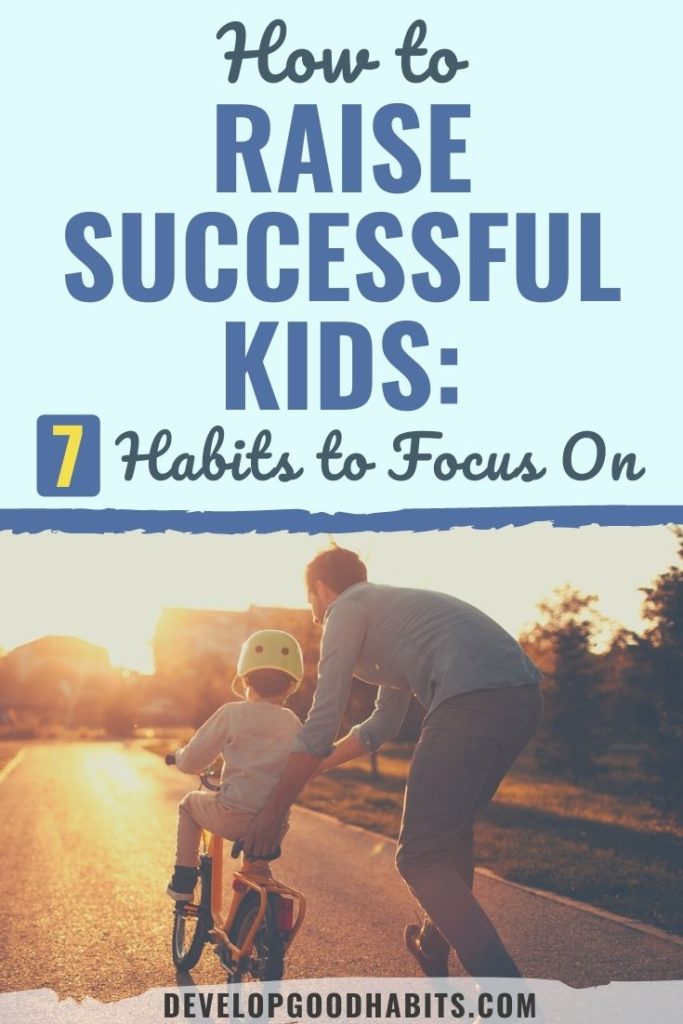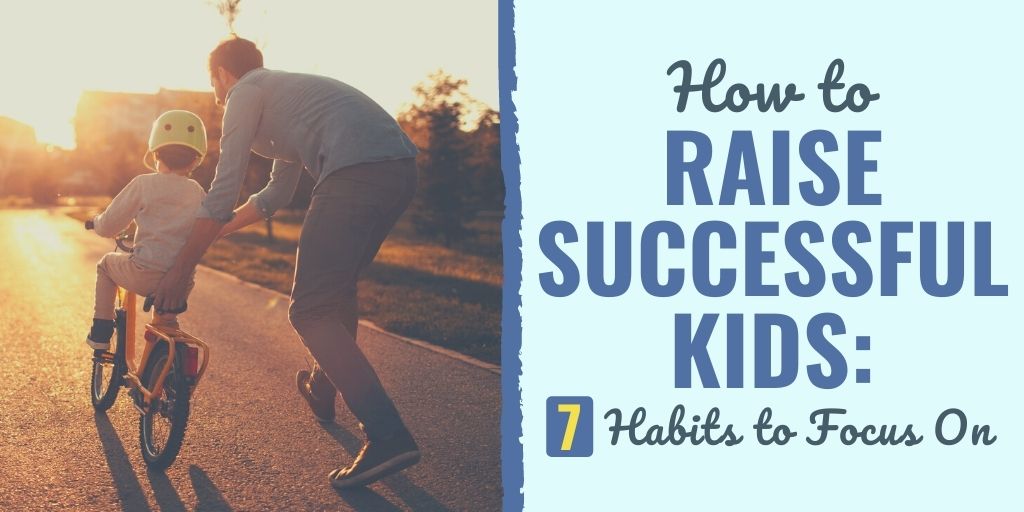As a parent, if you’re asked the question, “What do you want most for your children?”… the answer for most of us would be, “that they grow up to be healthy and happy”. A close second would be “that they are successful”.
The funny thing is, success can take on different meanings. One person’s definition of success may be financial security and a nice house, whereas another person’s definition may include a rewarding career or having a family. But why can’t it be a combination of all of those things?
Why can’t success simply be defined as being well-adjusted, confident and content with your life? After all, if you’re reading this and wondering how to raise successful kids, wouldn't these traits make it possible for any and all of their dreams to become reality?
The very definition of happiness is often intertwined with that of success. If you’ve landed the job of your dreams and have a spouse that loves you unconditionally, wouldn’t you consider your life to be a success? I know I would… and I do.
There is a famous saying, “Behind every successful man, there is a strong woman”. But I truly believe that it goes deeper than that. I’d venture to say that “Behind every successful person is a positive childhood experience”. If a parent, grandparent or mentor cares enough to make an effort to instill certain habits in a child from a young age… they will likely grow up to be a success in whatever they do.
If this sounds good to you, keep reading! I’m going to offer 7 habits you can put into practice today… in order to raise successful kids tomorrow.
What is Success?
The dictionary definition of success is simply this: the accomplishment of an aim or purpose. As you can see, it says nothing about wealth or celebrity.
Success can take on personal or professional meanings. Or both. In either case, it has to do with wants and desires. Fulfilling your dreams and reaching your goals.
If there is something your heart desires and you work hard to achieve it… that’s success!
H.G. Wells said, “The only true measure of success is the ratio between what we might have done and what we might have been on the one hand, and the thing we have made and the things we have made of ourselves on the other”. I believe what he is saying is that success is often self-made… and that we need to call upon everything we’ve learned in order to make it possible.
As adults, much of what we have learned in life – good and bad – stems from our childhood. That is why you often hear the most successful people in the world thank a family member when given accolades.
If you want your child to find true success, here’s a good place to start.
Habit #1. Preach Kindness and Empathy
I don’t know about you, but as a mom my number one parenting goal is to teach my kids kindness and empathy. If a child learns these lessons young, they are much less likely to get caught up in the murky waters of bullying, jealousy, deceit and greed as they go through life.
When I think about some of the most successful people in this world, I’m always wondering “what did they give back?” Or “how do they treat others?”. I just can’t imagine people wanting to follow or take orders from a nasty, self-indulgent or selfish person.
There’s an old saying, “you can catch more flies with honey than with vinegar”. When a person demonstrates kindness and compassion for others, they are more likely to get the results they seek. People are more willing to help and listen to those who are kind to them… and nobody climbs the ladder of success alone. There are always people along the way to propel them forward.
Furthermore, teaching a child empathy forces them to step in another person’s shoes. Perhaps that boy who bullies your son has an alcoholic father and a mother working two jobs… so his actions are a direct result of what he’s being taught at home. Keeping this in mind, your son may not be so quick to judge when he grows older. Conversely, your son may elect to find ways to connect with his bully and make him a better person.
Successful adults often have a support system… people that helped them get what they wanted. A kind and empathetic person can see the best in others and inspire them to unlock their full potential, which in turn, will result in success for all.
Habit #2. Discipline Them in a Constructive Way, Try Not to Yell
This one is easier said than done… trust me. I used to yell more than I’d like at my kids. They are at that age where they feel self-entitled and still don’t understand what it is their dad and I do for them, day in and day out.
There are days that I did, and still do, feel completely unappreciated. I’m a work-at-home mom who still makes sure the laundry is done, the house is clean, food is on the table and they make it to all of their weekly activities and appointments on time. Yet, I rarely hear a “thank you” or “do you need help?” from them.
Lucky for me, I stumbled across Positive Parenting Solutions, which offered me some super helpful tips for how to effectively discipline my kids without losing my mind. Think about it… yelling can not only make you feel like a monster, but at a certain point, it becomes white noise to kids.
Two of my favorite PPS tips are:
When you look into your child’s eyes and see that they have lost all ability to reason and have no desire to negotiate, you must recognize that you’re fighting a losing battle. No good will come from you losing your temper or threatening them.
The best thing you can do in this situation is walk away. Find a quiet corner in the house, step outside or sit in your car for a few minutes. Whatever it takes.
By not reacting to your child’s irrational behavior (or tantrum), you will paralyze them with confusion… thus, diffusing the bomb. If they know they can’t get a reaction from you, they will seek other ways to use their words more effectively.
This skill will help them deal with adversity and difficult people later on in their lives.
I like to think of the “when, then” approach as a part reward system/part decision making tool. If you want to get your child to do something, creating the illusion that they are in control and making the decision on their own, is a clever and effective way to do it.
For instance, if you are tired of harping on your 11-year-old daughter to do her chores day in and day out, what do you do? Threaten her with grounding or loss of phone privileges? We all know most kids don’t respond kindly to threats. And, if I’m being honest, I don’t often carry my threats out. I give my kids more chances than they deserve to come around… and that is exhausting! Plus, it teaches nothing. Why am I bartering with a child?
So instead, PPS suggests saying something like this: “When you make your bed and bring your dirty laundry downstairs, then you can call Sara.” At this point, your child feels as if it’s up to them to decide if they want to help out or not, in order to call their friend. That they are just “working towards” something they want, instead of obeying your rules. Thus, your child gets a subtle lesson in decision making, without even realizing it. And, as a bonus, their chores get done… without putting up a fight.
For more on online classes, here's our roundup of the best online parenting classes to try.
Habit #3. Let Them Stop to Smell the Roses
The most successful people in life are often very much intune with their mind and body’s need for self-care. They make sure to schedule time for themselves to improve or maintain their mental and physical fitness.
The two go hand-in-hand. If you’re depressed or stressed, you may want to overeat or skip your workout. Regular workouts deliver endorphins to the brain, which improve mood and reduce brain fog.
Mental clarity and being centered is probably the more important of the two when it comes to raising successful kids. If their head isn’t in a good place, they may be plagued with self-doubt, lacking the confidence they need to get ahead.
Introducing them to things like nature walk and hikes, art, yoga and meditation teaches them the importance of slowing down to regroup, refocus and recharge. Successful people did not get to be where they are without facing challenges or stress along the way… but it’s how they were taught to handle it that kept them at the top of their game.
Habit #4. Teach Them About Healthy Competition
I know this is going to sound cliché, but sports are a really great way to introduce kids to the importance of healthy competition. And by “healthy” competition, I mean teaching them not just about winning and reaching goals… but how to handle loss as well.
Your kids are never going to win or be the best at everything they set out to do. That is part of being human… and a part of life. Teaching your kids how to graciously handle victory, while handling defeat just as gracefully, is the key to their success.

You’ve heard people say, “nobody likes a sore loser”. Well, the same goes for an ungracious winner. Both will alienate your child in some form or another, which will hinder their personal and professional growth.
They need to be ok with occasional failure and use it as an opportunity to learn from their mistakes. Similarly, when they excel at something, they need to pay respect to those that fell short and provide them with words of encouragement and gratitude for the opportunity.
Enrolling them in sports doesn’t always have to involve team play, although that in itself can teach the distinct lesson that it often takes a village to succeed. Individual sports, such as tennis, karate or rock climbing, can teach the importance of determination and inner strength. These are very much mental sports, which will help to teach your child the importance of positive self-talk to grow their confidence. If a child believes in his or herself, they are unstoppable!
Habit #5. Teach Them to Manage their Emotions
Starting at birth, kids struggle to manage and convey their emotions effectively. Think about it.
Babies who are hungry or tired, will cry. Toddlers throw tantrums that typically have nothing to do with their parents, but they don’t yet know how to process the difference between frustration, fatigue and anger.
As children grow, they may encounter feelings of anxiety, sadness or jealousy that cause them to lash out or cry on a dime… convincing them there may be something wrong with them. This is most often not the case.
The real issue is they don’t know how to manage their emotions the right way, so instead they compartmentalize them. It’s like their brain is sending mixed signals, or short circuiting, and they confuse their feelings.
The next time your child lashes out, cries or seems withdrawn… talk to them. Encourage them to use tools like journaling or meditation. (Here are some great gratitude prompts and journal prompts for kids.) Engage them in mindfulness activities. They just need a lesson in self-awareness. Anything that will help them to slow down and get to the root of what is really happening.
Successful people are often able to acknowledge their feelings and then do what’s necessary in order to address them… without damaging important relationships in the process.
Habit #6. Love Them Unconditionally, Be Accepting
I’ve saved my two favorite bits of advice for last. This one has to do with unconditional love and acceptance, both of which are critical to raising a well-adjusted and successful child.
Starting from infancy, a child views their parents as the most important people in his life. He knows that you are taking care of him… feeding and clothing him, changing diapers, swaddling and nurturing him. You are there when he takes his first step, cheering him on and clapping.
The moment you gave birth, you were appointed your child’s cheerleader, which doesn’t mean that you only support him when he is hitting milestones or filling a mold you’d like for him to fit into. What it really means is that you’ve signed an unspoken contract to support him always, even when he doesn’t meet the expectations you had for him.
The most successful people in life are typically happy with themselves. That is because their parents taught them the importance of being a good person, above all else. If you are right on the inside, you’ll never go wrong outside in the world.
Successful people also know that their parents will love them, even when they fail… because they have been told that time and again. Failure does not change the person you are inside.
The world may be a more accepting place now than it ever was… which is great. And the reason for it? Parents who teach their children that different isn’t bad. They preach acceptance and tolerance of all lifestyle choices, religions, races, health issues, disabilities and beliefs.
Steven Hawking is the perfect example of someone who’s loved ones, his wife especially, never told him he couldn’t accomplish anything he set out to do. He didn’t let his disease stop him from becoming one of the greatest minds in history.
Habit #7. Be Their Advocate
My oldest child has been bullied by at least one child every year since kindergarten. It typically has to do with him being short. While he hasn’t hit his growth spurt just yet (he’s a summer baby in classes with kids more than 1 year older than him), we keep stressing that a person isn’t measured by size… but by the size of their heart. And when he is bullied, we do not sit idly by. We advocate for him to stand up to the issue.
We used to reach out to the school directly when he was younger, but now that he’s in middle grades, we encourage him to try and fight his own battles. Not with violence, unless it’s warranted, but by talking to someone about it. If he still needs help, we fight alongside him… every time.
My friend has a child with autism. Her entire life for the last decade or so has been spent advocating for his educational rights to ensure that he is not left behind. He is a brilliant and kind young man, who would have fallen through the cracks, had his mom not been involved in his plan of care.
She advocates for support groups and helps him foster friendships to let him know that he is not alone… nor is he different in a bad way. As a result, he has never given up and is growing into a confident and personable teenager who is now capable of looking people in the eye much more frequently.
When a child has a parent who never gives up on them, who follows their instincts and provides them with the tools they need to overcome adversity… they will feel unstoppable and know that anything is possible. Success is possible.
Final Thoughts on Raising Successful Kids
People are not born successful. They don’t come with a “success guarantee” like some customer service sales point. Success takes hard work… and the work starts at home.
Home is where the foundation is laid for your child’s future. It is where she learns all she needs to build the life she wants. She learns the lessons of kindness and empathy, proper discipline, self-care, healthy competition, managing emotions, unconditional love and acceptance and the value of having someone in her corner.
If you want to know how to raise successful kids, start by defining what success means to you. Then, put the feelings of what you want for your kids aside. Tuck them away for a while and practice the habits we outlined here to help them find their own path… define their own happiness.
Whatever your child decides that success means for them, they’re going to make it happen because they had you as guideposts along the way. They will find true happiness in life by their own measure… and happiness is really what it’s all about. Success means nothing if you’re not happy and well-adjusted enough to appreciate it.
For more information on raising successful teens who are battling anxiety, check out this article.
See some fun ideas for kids activities:
- 7 Effective Strategies Overcoming Mom Guilt
- 35 Fun Things to Do When Your Kids Are Bored
- 11 Fun Memory Improving Games for Kids in 2025
- 14 Inspirational & Motivational Short Stories for Kids

Nicole Krause has been writing both personally and professionally for over 20 years. She holds a dual B.A. in English and Film Studies. Her work has appeared in some of the country’s top publications, major news outlets, online publications, and blogs. As a happily married (and extremely busy) mother of four… her articles primarily focus on parenting, marriage, family, finance, organization, and product reviews.


